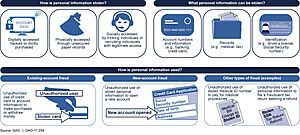Identity theft facts for kids
Identity theft is the deliberate use of someone else's identity, usually as a method to gain a financial advantage or obtain credit and other benefits in the other person's name, and perhaps to the other person's disadvantage or loss. The person whose identity has been assumed may suffer adverse consequences, especially if they are held responsible for the perpetrator's actions.
Identity theft occurs when someone uses another's personally identifying information, like their name, identifying number, or credit card number, without their permission, to commit fraud or other crimes. The term identity theft was coined in 1964. Since that time, the definition of identity theft has been statutorily prescribed throughout both the U.K. and the United States as the theft of personally identifying information, generally including a person’s name, date of birth, social security number, driver’s license number, bank account or credit card numbers, PIN numbers, electronic signatures, fingerprints, passwords, or any other information that can be used to access a person’s financial resources.
"Determining the link between data breaches and identity theft is challenging, primarily because identity theft victims often do not know how their personal information was obtained", and identity theft is not always detectable by the individual victims. More recently, an association of consumer data companies noted that one of the largest data breaches ever, accounting for over four million records, resulted in only about 1,800 instances of identity theft, according to the company whose systems were breached.
An October 2010 article entitled "Cyber Crime Made Easy" explained the level to which hackers are using malicious software. As one security specialist named Gunter Ollmann said, "Interested in credit card theft? There's an app for that." This statement summed up the ease with which these hackers are accessing all kinds of information online.
The new program for infecting users' computers is called Zeus; and the program is so hacker friendly that even an inexperienced hacker can operate it. Although the hacking program is easy to use, that fact does not diminish the devastating effects that Zeus (or other software like Zeus) can do to a computer and the user. For example, the article stated that programs like Zeus can steal credit card information, important documents, and even documents necessary for homeland security. If the hacker were to gain this information, it would mean identity theft or even a possible terrorist attack. The ITAC says that about 15 million Americans are having their identity stolen, in 2012.
Types
Sources such as the non-profit Identity Theft Resource Center sub-divide identity theft into five categories:
- Criminal identity theft (posing as another person when apprehended for a crime)
- Financial identity theft (using another's identity to obtain credit, goods and services)
- Identity cloning (using another's information to assume his or her identity in daily life)
- Medical identity theft (using another's identity to obtain medical care or drugs)
- Child identity theft.
Identity theft may be used to facilitate or fund other crimes including illegal immigration, terrorism, phishing and espionage. There are cases of identity cloning to attack payment systems, including online credit card processing and medical insurance.
Identity cloning and concealment
In this situation, the identity thief impersonates someone else in order to conceal their own true identity. Examples might be illegal immigrants, people hiding from creditors or other individuals, or those who simply want to become "anonymous" for personal reasons. Another example are posers, a label given to people who use somebody else's photos and information through social networking sites. Mostly, posers create believable stories involving friends of the real person they are imitating. Unlike identity theft used to obtain credit which usually comes to light when the debts mount, concealment may continue indefinitely without being detected, particularly if the identity thief is able to obtain false credentials in order to pass various authentication tests in everyday life.
Images for kids
-
US Government Accountability Office diagram showing the identity theft risk associated with social security numbers on Medicare cards
See also
 In Spanish: Robo de identidad para niños
In Spanish: Robo de identidad para niños




